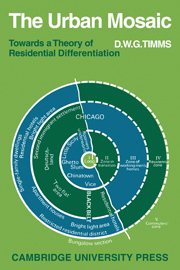Book contents
Preface
Published online by Cambridge University Press: 05 January 2012
Summary
Well-supported theories are still in short supply in the social sciences. Observations and hunches, on the other hand, are plentiful. The task of bringing theory and observation together is rendered difficult by the imprecision of many theoretical statements in the social scientific literature and by the dubious validity of many of the observations. It will be all too apparent that both faults are characteristic of much of the argument which forms the substance of the present work. Rather than an integrated theory of the residential differentiation of the urban population, complete with supporting evidence, what is presented should be regarded more as a series of essays towards such a goal. The generalizations offered frequently go beyond the evidence. This is particularly the case when attention is paid to the non-Western or pre-modern city. In the present state of the social sciences, however, it is felt that the dangers of over-generalization are less pronounced than are those of under-generalization. If nothing else, it is hoped that the essays will throw up a number of useful ‘Aunt Sallys’.
An overall summary of the book is provided in a brief last chapter. Chapters 1 and 2 are concerned with delimiting the nature and significance of residential differentiation. In the first chapter the notions of neighbourhood and of neighbourhood differences are explored in terms of a variety of human behaviours.
- Type
- Chapter
- Information
- The Urban MosaicTowards a Theory of Residential Differentiation, pp. vii - viiiPublisher: Cambridge University PressPrint publication year: 1971

